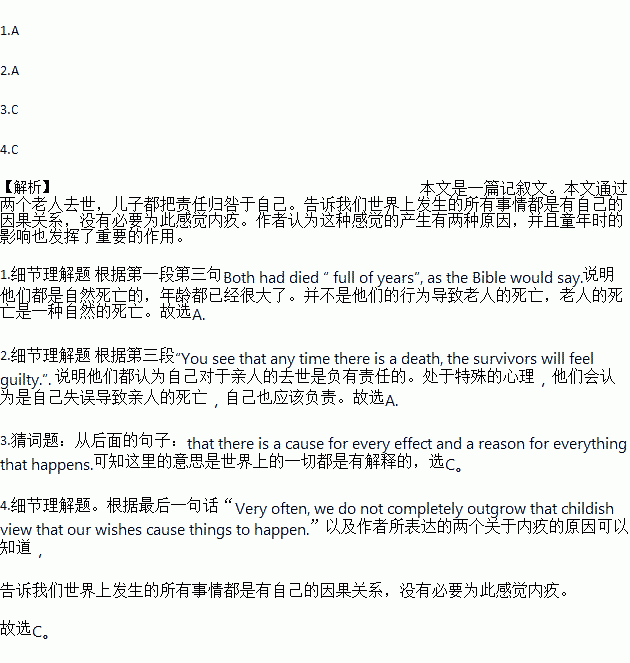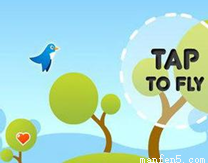题目内容
I had an experience some years ago, which taught me something about the ways in which people make a bad situation worse by blaming themselves. One January, I had to hold two funerals on days in a row for two elderly women in my community. Both had died “ full of years”, as the Bible would say. Their homes happened to be near each other, so I paid condolence(吊唁) calls on the two families on the same afternoon.
At the first home, the son of the deceased(已故的)woman said to me, “ If only I had sent my mother to Florida and gotten her out of this cold and snow, she would be alive today. It’s my fault that she died.” At the second home, the son of the other deceased woman said, “ If only I hadn’t insisted on my mother’s going to Florida, she would be alive today. That long airplane ride, the sudden change of climate, was more than she could take. It’s my fault that she’s dead.”
You see that any time there is a death, the survivors will feel guilty. Because the course of action they took turned out bad, they believe that the opposite course—keeping Mother at home, putting off the operation—would have turned out better. After all, how could it have turned out any worse?
There seem to be two elements involved in our willingness to feel guilty. The first is our pressing need to believe that the world makes sense, that there is a cause for every effect and a reason for everything that happens that leads us to find patterns and connections both where they really exist and where they exist only in our minds.
The second element is the view that we are the cause of what happens , especially the bad things that happen. It seems to be a short step from believing that every event has a cause to believe that every disaster is our fault. The roots of this feeling may lie in our childhood.
A baby comes to think that the world exists to meet his needs, and that he makes everything happen in it. He wakes up in the morning and summons the rest of the world to its tasks. He cries, and someone comes to attend to him. When he is hungry, people feed him , and when he is wet, people change him. Very often, we do not completely outgrow that childish view that our wishes cause things to happen.
1.We learn from the passage that the two deceased elderly women_____________
A. lived out a natural life.
B. died of exhaustion after the long plane ride.
C. weren’t used to the change in weather.
D. died due to lack of care by family members.
2.People feel guilty for the deaths of their loved ones because they believe _____.
A. they are responsible
B. they overlook the natural course of events
C. they can’t find a better way to express their sorrow
D. they didn’t know things often turn in the opposite direction
3.According to the passage, the underlined part in paragraph 4 probably means that_____.
A. everything in the world is predetermined
B. the world can be explained in different ways
C. there is an explanation for everything in the world
D. we have to be sensible in order to understand the world
4.What’s the idea of the passage?
A. Life and death is an unsolved mystery.
B. Every story should have a happy ending.
C. Never feel guilty all the time because not every disaster is our fault.
D. Usually, the survivors will feel guilty about the people who passed away.


